What Audiences Want:
A successful event creator understands what makes their audience tick — they know where to find them, how to craft the right messaging to reach them and, importantly, what they want and expect on the day of the event.
Once you have established who your ideal audience is, the next step is reaching them. There are many ways to do this with maximum impact, from choosing the right ticketing platform (ideally with a built-in audience of curious, engaged people with diverse interests), to building a solid promotion strategy.
In Q4 2022, Eventbrite helped creators connect with 11.7M unique paid ticket buyers — our largest consumer audience in three years!
Based on the findings of our extensive 2023 Event Trends Report, we identified seven priority attendee personas for you to consider for your next event. From the connection-seekers who crave community to the experience-chasers who prioritize events above everything else, here are the emerging audience trends and top tips for reaching and talking to these attendees.
1. Essentialists
Meet the 10% of global attendees who say events are an “essential priority.” But just who are they?
Events are an ‘essential priority’

In addition to skewing toward a younger demographic, essentialists tend to identify as introverts (32%) as opposed to extroverts (26%) and are more likely to spend more on events in 2023 (45% compared to the 30% global average). And though they’re keen music lovers, they’re much more likely than the average attendee to embrace 5k walks, spirituality events, networking, speed dating, and silent discos.
Question to attendees: Which of these events do you want to see more of?
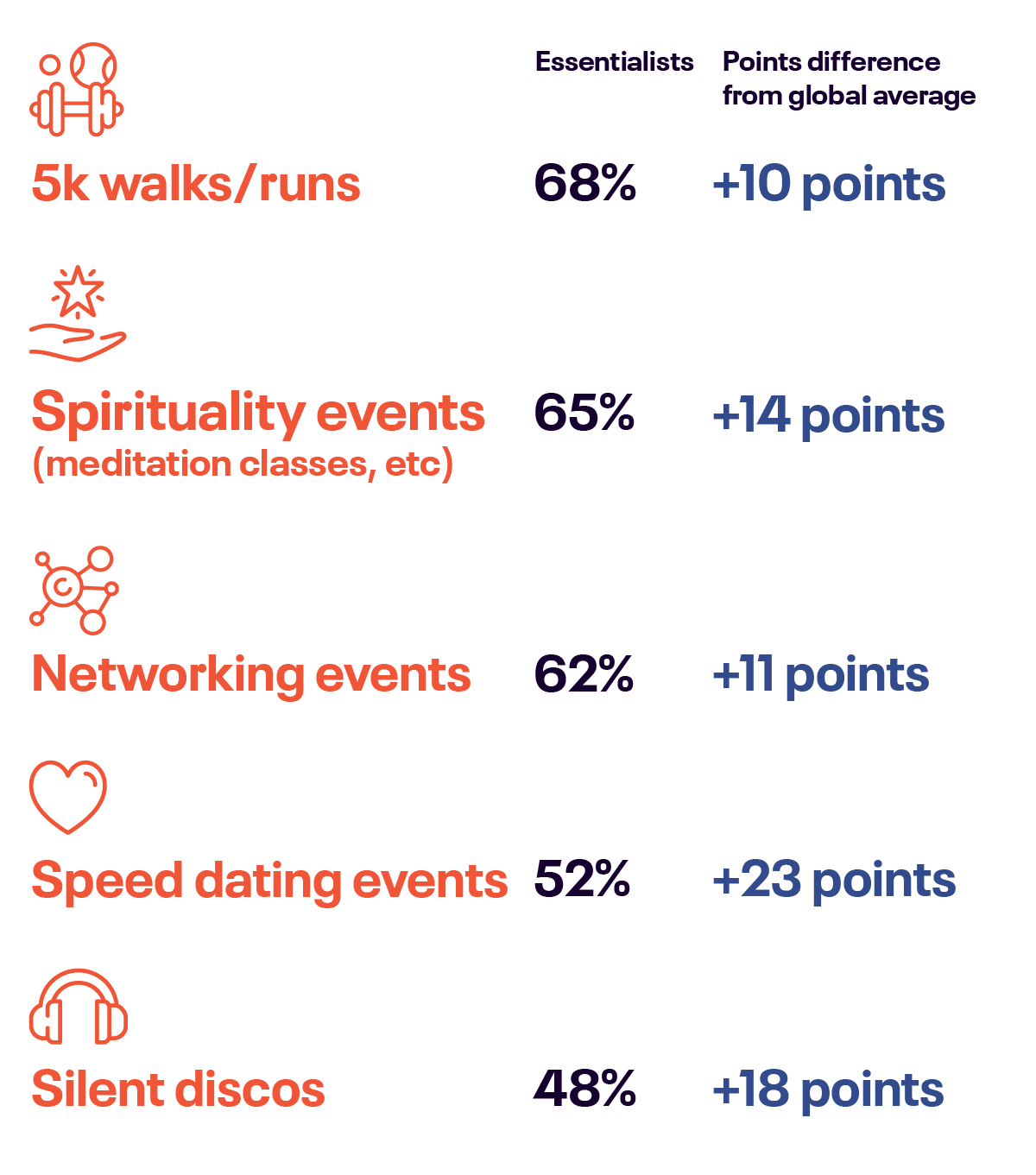
How can you reach essentialists?
To attract these high-value fans and ensure your events are deemed essential, pay attention to the things that interest them — whether by planning a 5k race, hosting a networking opportunity that genuinely connects people, or organizing a speed-dating event.
Essentialists and niche events are a perfect match, so don’t be afraid to explore unexpected and innovative offerings. If you’re searching for inspiration, check out the British yoga practitioners experimenting with novel variations to suit a variety of tastes, lifestyles, and personality types — from laughter yoga to yoga with goats.
In addition, tap into essentialists’ willingness to spend by exploring new revenue streams. The Eventbrite Add-Ons tool makes it easy to sell merchandise, food vouchers, and more, all while tracking what customers are buying and when they’re buying it. Another idea is to create ticket types that include merchandise, enabling you to sell T-shirts, books, albums, and anything else to attendees when they’re most motivated and excited to attend the event.
Essentialists are always looking for new events and experiences. This makes them the perfect demographic to target your ads and content to. Eventbrite Boost has all the marketing tools you need to reach essentialists at every point of their journey as they search for events — in fact, event creators who use Boost marketing tools sell 63% more tickets every year vs. those who don’t!
2. Connection-seekers
The opportunity to connect with people who share your interests has long been a motivating factor for global attendees. Our Event Trends Report found in-person events make people feel happy (63%), connected (54%), and energized (53%). These responses were consistent across genders and age groups.
And since the pandemic, it’s never been more important for creators to build communities, especially for the 61% of people who rely on events to reduce feelings of isolation and loneliness.
How can you reach connection-seekers?
Review your community-building efforts. Our survey revealed 81% of creators globally believe growing a community is “extremely important” or “very important”, but that doesn’t mean it’s easy to execute.
Growing email subscriptions and an attendee list is the most challenging part of building a community, so now’s the time to review your email marketing strategy. Embrace tactics to grow your email list (including inbound marketing and email capture forms, paid social media, prizes, and giveaways), and explore tools to help collect attendees’ contact information while at an event.
Question to event creators: What is most challenging about building community? (Global %)
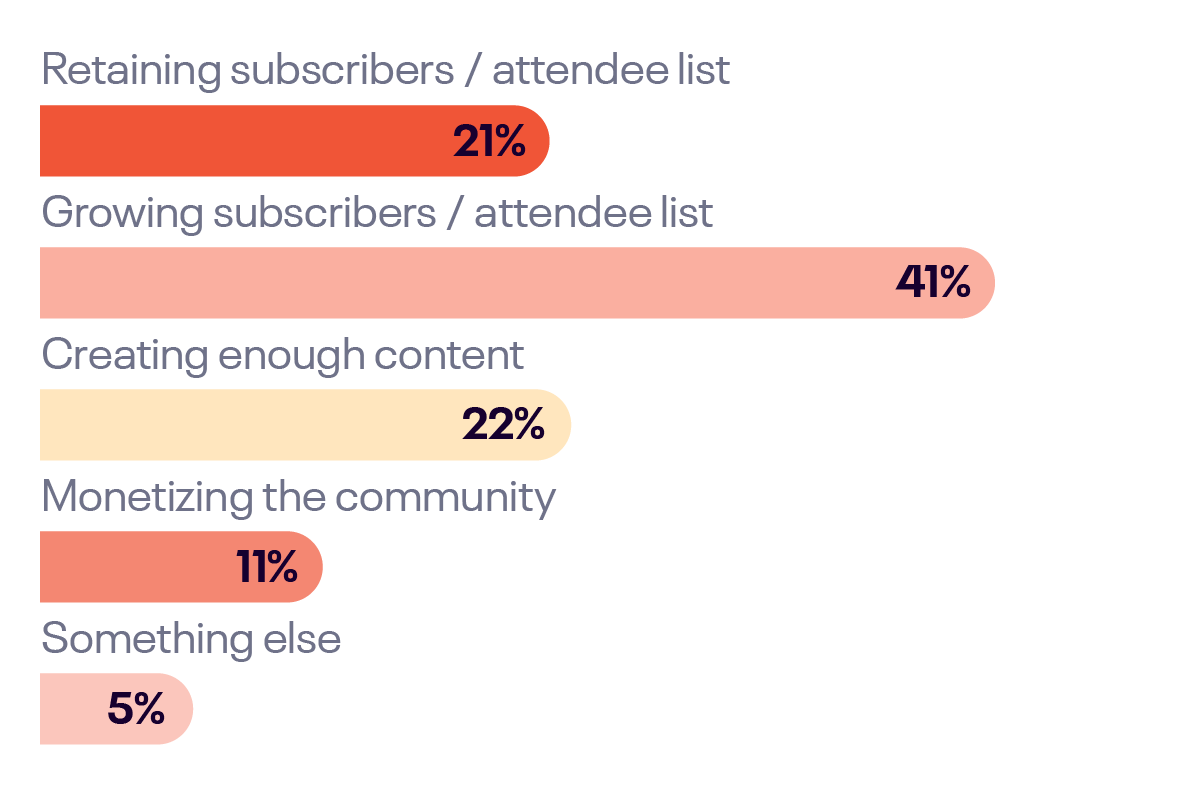
Given events are an antidote to loneliness, what can you do to promote connections? Step up your communication before and after an event. Cultivate a loyal event community by asking what attendees would like to see, committing to a consistent publishing schedule (whether that’s a weekly email newsletter, blog post or video upload to YouTube), sharing images from the event, and responding to comments on your social media channels.
Finally, don’t ignore the gender and generational divide our survey uncovered:
Question to attendees: How often do you feel socially isolated and/or lonely?
Answer: ‘Almost always’ and ‘often’
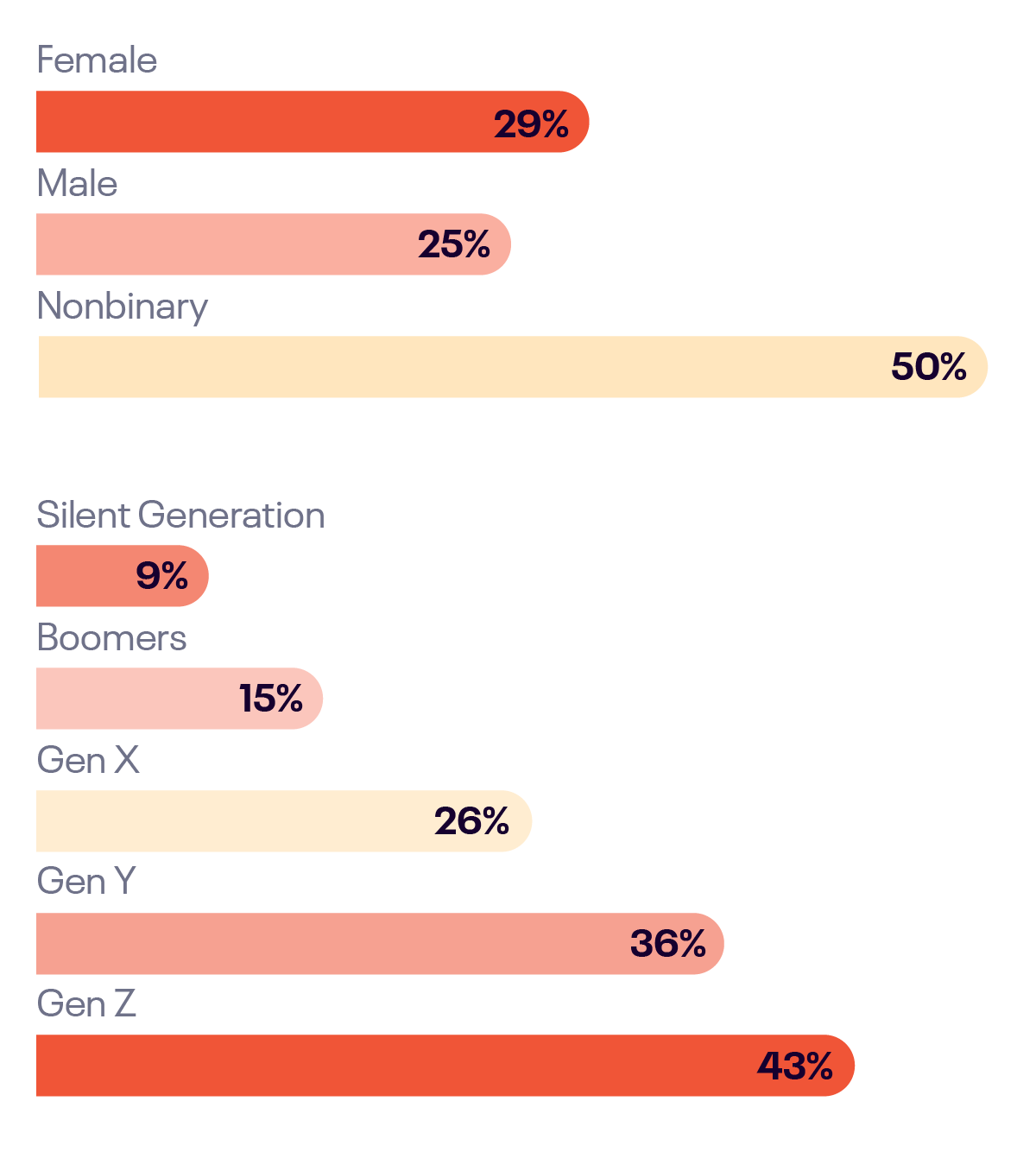
Almost half (43%) of Gen Z attendees and 50% of attendees who identify as non-binary “almost always” and “often” feel socially isolated or lonely. As you seek to build community and foster connections, look for ways to make your events more inclusive and diverse. From creating a code of conduct, pursuing positive partnerships, and sharing the steps you’re taking on social media, you can create a safe space where people can come together.
Quote from Creator Spotlight.
“We aspire to create beautiful and engaging high-energy events that bring people together to celebrate the best of life through a shared connection.”
— Prashant Kakad, AKA DJ Prashant
Quote from event creator in survey.
“I feel optimistic about the sense of community and comradery that builds because of my events — connecting with people who are passionate about the same thing as I am, and seeing strangers become friends.”
3. Experience-chasers
Don’t stress over finding the perfect gift for this audience — these attendees want to receive tickets! Experience-chasers fill their diaries with festivals and concerts and prioritize in-person events over physical items.
Question to attendees: Would you rather receive a physical gift or tickets to a live experience?

Although our survey revealed most people prefer to stick to what they know, there’s a notable group of attendees who are hungry for novelty. Those who prefer a new experience over a known performer are:

In addition, 11% of global attendees are happy to pay more for a great experience no matter the performer.
How can you reach experience-chasers?
Embrace the experience economy by delivering surprising, delightful, and memorable moments. Our survey found two in three event creators believe their job is less about producing events and more about designing experiences, so think about how you can create something special.
Personalized experiences demonstrate you understand what attendees want and can enhance their enjoyment of an event. Carry out audience research to understand what’s best. Pre- and post-event surveys, market research, competitor research, and short on-site interviews will help you better understand your experience-chasers.
This persona is one that brand owners and communications and marketing professionals should take extra-special notice of — and that’s because an immersive event is a great way to connect with consumers. Remember, an experiential marketing event isn’t a place to sell your products or services. It’s a place where you can build positive associations and emotions with your brand, and ensure it’s top of mind when attendees are ready to make a purchase.
Finally, our survey revealed 52% of global attendees expect to attend more events and live experiences in 2023 compared to 2022, while 68% plan to spend more or about the same on events and live experiences in 2023. Capitalize on these intentions by considering premium experiences and VIP ideas — these can be a robust source of added revenue. Exclusive previews, behind-the-scenes access, and special guests are just a few of the things you could offer top-tier ticketholders.
You can also make it easy for attendees to replace present-buying with ticket-giving by marketing your tickets as the ultimate gift.
Quote from US attendee in survey.
“I recently went to see a favorite content creator of mine on his tour. It was my first time being able to purchase my own tickets so I chose the VIP experience. It was a lot more personal than the show and the show itself exceeded my expectations, it was overall one of the best nights of my life.”
4. Comfort-zoners
Attendees worldwide are enjoying a post-pandemic party atmosphere, but rather than embracing the great unknown, this persona shows a preference for the things they already know.
Comfort-zoners are keen to attend familiar venues that are close to home with existing friends — and there’s a clear generational divide. Boomers want a location they know (68%), while Gen Z wants to explore a new spot (60%).

How can you reach comfort-zoners?
This persona wants to feel safe and secure at an event, so creators should lean into their attendees’ desire for known experiences and local communities and steer away from unexpected surprises. Ensure your event page clearly states where the venue is and outlines travel, parking, and accessibility information in detail.
Make it easy for friends to stick together by selling group and/or table tickets and champion the people and places they’re familiar with by injecting an element of community-building into your events.
Comfort-zoners tend to be from an older demographic and are likely to engage with local publications (think regional newspapers and neighborhood-focused online bulletin boards), so use this to your advantage as you plan your marketing strategy.
When reaching out to comfort-zoners, ensure your messaging highlights the hyper-locality of your events. Make life easier for yourself by choosing a discovery platform that effectively surfaces these events to local audiences. Eventbrite creators can use Eventbrite Ads to promote their events on our site to localized target audiences, with creators who do so seeing 18% more revenue from their events than those not using the feature.
5. Introverts
With the global data from our 2023 Event Trends Report revealing that 30% of attendees identify as introverts, event creators would be wise to familiarize themselves with this important persona.
In 2023, introverts plan to seek out events that allow them to “spend time on hobbies.” They’re more likely to gravitate toward intimate settings, locations they’re familiar with, and events that are close to home (there’s overlap with comfort-zoners, and some creators might find that their events suit both personas). In addition, they tend to stick with friends rather than meet new people and are less comfortable trying out new experiences.
But though introverts express similar sentiments to comfort-zoners, it’s essential that creators are aware of the social anxiety that can affect these attendees’ behaviors.
Across everyone we surveyed, nearly one in five (19%) avoid live events due to introverted tendencies, while more than two in three introverts avoid in-person events because they involve socializing and/or meeting new people. In addition, Gen Y and Gen Z are more likely to agree that in-person events can make them feel anxious.
In-person events and/or experiences make me feel… anxious
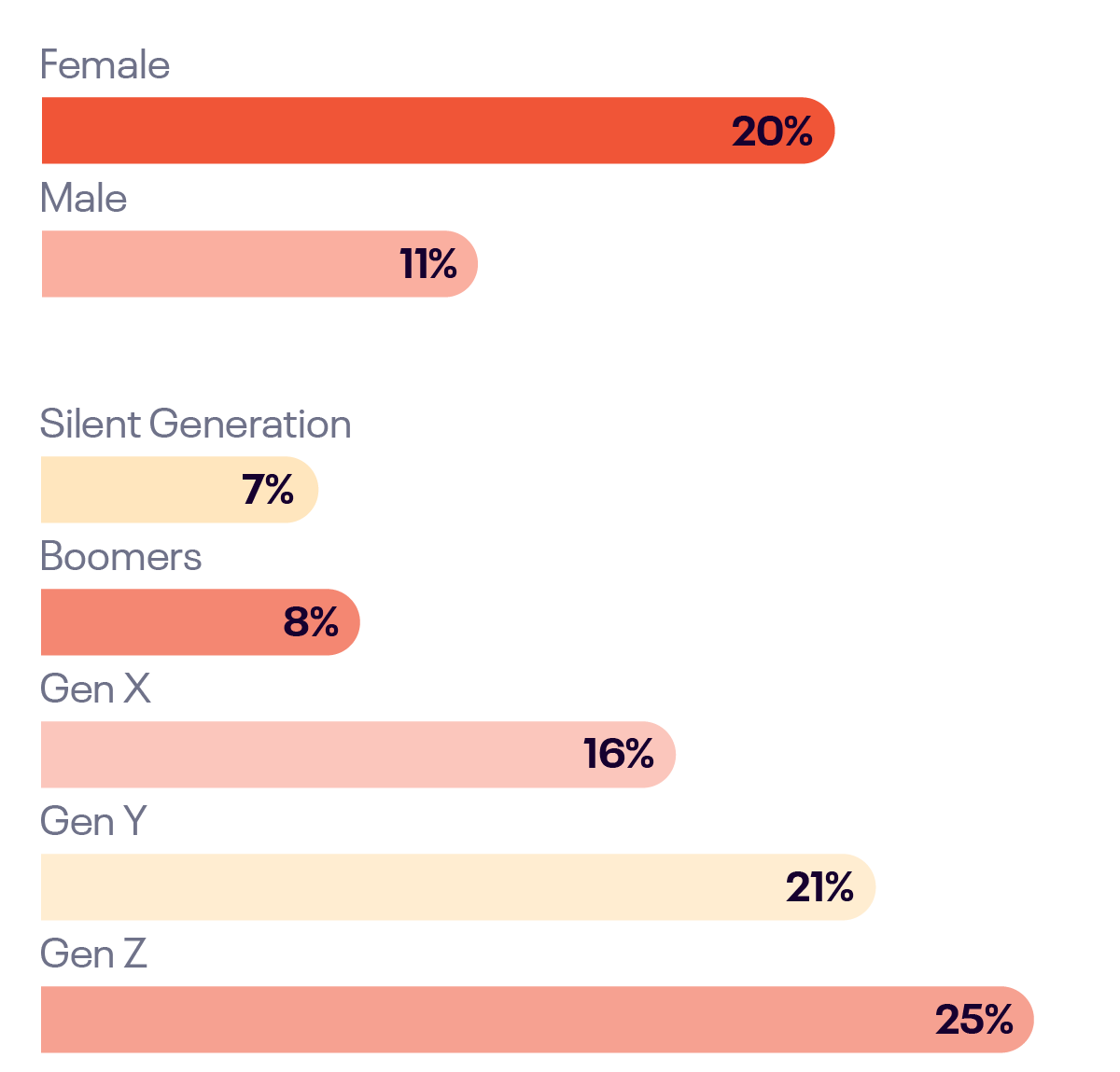
How can you reach introverts?
It’s not just event creators in the arts and crafts space who should speak specifically to the introverts among their attendees. The industry as a whole has a responsibility to look for ways to help lessen anxiety through pre-event messaging and on-site experiences.
Show you care about people’s well-being via the emails you send and the information you include on your event landing page. When it comes to managing attendee anxiety, psychologist Dr Andrea Bonier says unpredictability heightens the stress response.
So clearly explain what the event will involve, outline the safety protocols and precautions you have in place, and mention the measures you are taking to put attendees at ease — whether that’s limiting the number of tickets you plan to sell to avoid overcrowding, setting aside a dedicated quiet zone where people can take a break, and having wellness ambassadors on-site running meditation classes or sharing simple breathing exercises
Have you considered hosting a hybrid event? While introverts aren’t any more likely to attend virtual events than extroverts, they are more likely to say virtual events help them with their social anxiety. To reach introverted attendees, consider streaming your event online or sharing a recording. In the short-term, more people will be able to attend your event, and in the long-term, this kind of transparency might persuade someone to attend a real-life event in the future.
And if you’re already running online events, look to create a virtual safe space that incorporates inclusivity, is easily accessible, and where participation is optional.
Quote from Creator Spotlight.
“It’s so important for an organizer to be a good host. The majority of our attendees are business owners who come on their own, so it has to be a really welcoming, warm and positive atmosphere. We try to say hello to everyone and introduce them to other people, because we don’t want anyone to feel left behind.”
— Tara Mei
Quote from Creator Spotlight.
“The more people see your brand [via Boost], the more they’re going to want to engage with it. It’s [Eventbrite] a good hub for off-the-beaten-path types of events that aren’t headlining bands and really popular things.”
— Mackenzie Hatfield
6. Onliners
In-person events are back, but virtual events remain a viable option, allowing creators to reach more people and attendees to access events they might otherwise have missed. Convenience, cost, and ease are motivating factors for onliners.

How can you reach onliners?
When an event is offered in-person and virtually, 64% of global attendees prefer in-person. However, 41% of global attendees attended a virtual event last year, indicating that digital should be seen as a complementary channel that’s sticking around for the year ahead.
Onliners tend to be younger — 52% of Gen Z attended a virtual event last year compared to 26% of Boomers — so think about your target audience, and how you can attract and retain their interest.
Our survey found 39% of event creators price virtual tickets at the same level as in-person tickets, so if you aren’t already hosting virtual events (or are hosting them as an emergency-only option), you might be missing out on an important revenue opportunity.
Discover strategies to improve online attendance, from finding the right video-hosting platform to engaging your audience, and explore how you can embrace hybrid events. Finally, get creative — 21% of global attendees enjoy the live-virtual interactions of online events, so look at how streaming platforms and immersive AR and VR technologies can attract onliners.
And, as always, check in with online attendees (as well as sponsors and investors) just as you would in-person attendees with a post-virtual event survey that’s designed to reveal their thoughts and feelings about the digital experience.
Quote from US attendee in survey.
“I’ve noticed more and more technology to better capture events for people to relive afterwards, or to view from their homes. It brings the experience that much more to life and makes it just as enjoyable as if you were there in the first place.”
Quote from Australian attendee in survey
Question: Have you experienced anything new, exciting, cool or surprising at an event/ experience in 2022?
“I get to experience a virtual reality music concert and get to go up close to the performers as if I was next to them.”
7. Social-savvy
Relying on visual-first platforms like Instagram, Facebook, and TikTok to find out about events and live experiences, social-savvy attendees tend to be female (46%, compared to 37% of men) and are predominantly Gen Y (58%) or Gen Z (60%).
Question to attendees: How did you find out about that event/live experience?’
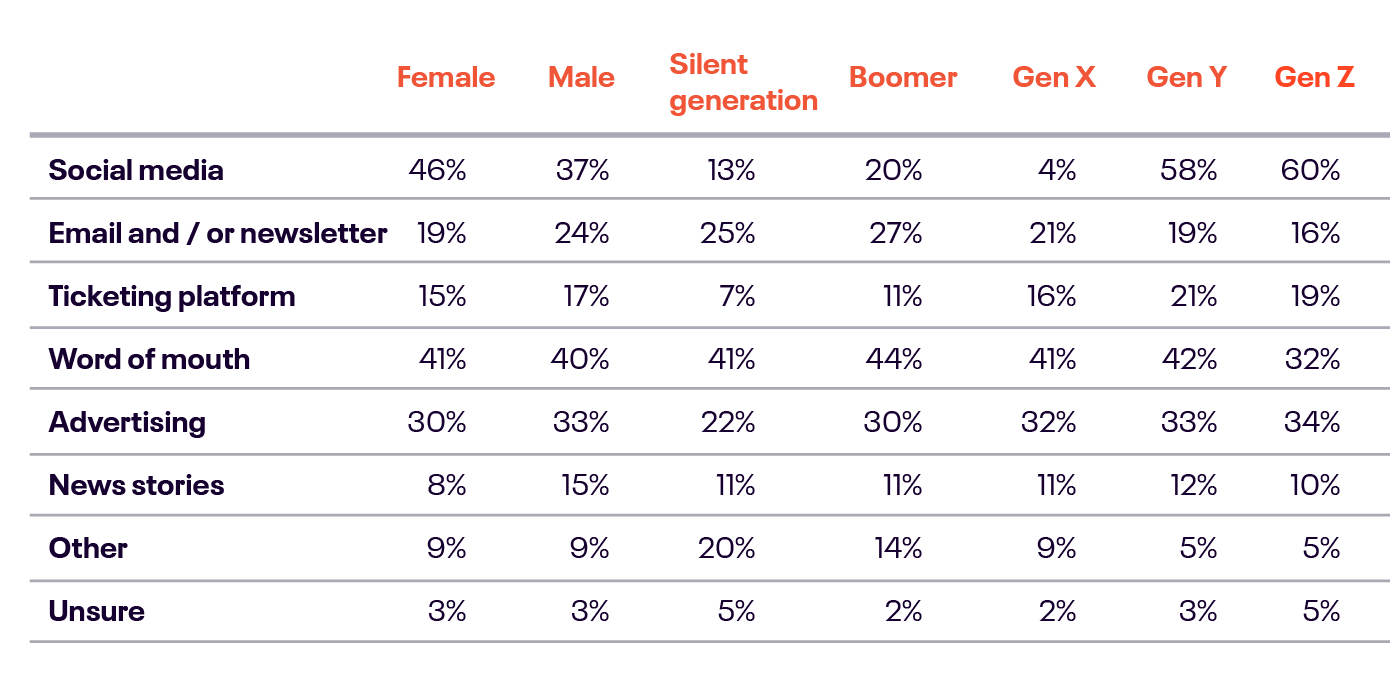
How can you reach social-savvy attendees?
We know the most-effective tactics creators use to promote their events are social media (43%), email marketing (38%), and social ads (24%). But remember: Social media isn’t just about promoting events. It’s an event destination in itself — a place where fans can come together and even end up meeting in real life.
Quote from US attendees in survey.
Question: Have you experienced anything new, exciting, cool or surprising at an event/ experience in 2022?
“I meet some social media friends!”
“Meeting people who only had communicated through social media.”
Creators can use a range of platforms to live-stream events for fans (perfect for video-loving Gen Y and Gen Z), embrace immersive technologies (great for experience-chasers), and engage (ideal for connection-seekers).
And just as social-savvy attendees use technology to complement their experience of an event, you can use it to take your organizational and promotional skills to the next level. We’re talking about event technology, such as radio-frequency identification (RFID) wristbands, QR codes, and time-saving email marketing with Eventbrite Boost.
But what about the not-so-social-savvy? Our research reveals a lot about different demographics’ preferred methods of communication — like the Boomers who would prefer to find out about an event or live experience via word of mouth (44%), advertising (30%) or email (27%). Lean into your target audience’s preferences by prioritizing the promotional tactics that resonate with them, and for your social-savvy cohort, picking the social platform that showcases your event most effectively.
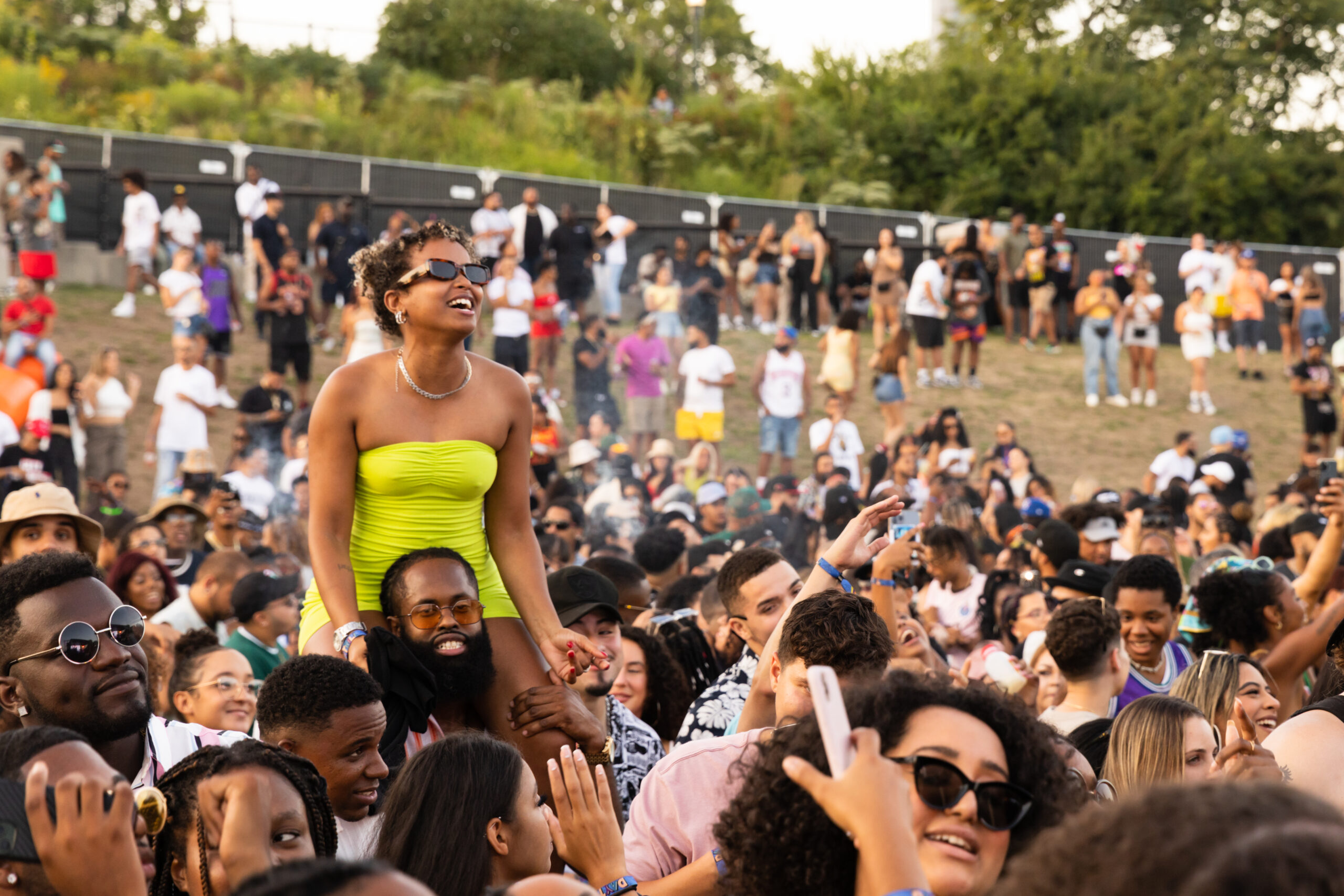
Gain further insights to help you tailor events to different attendee personas, and discover the direction the industry is heading with our 2023 Event Trends Report.
Ready to reach more people?
Ready to reach more people? Check out our Eventbrite tools designed to help you market to your audience, grow your demand, and sell more tickets by contacting our experts today.